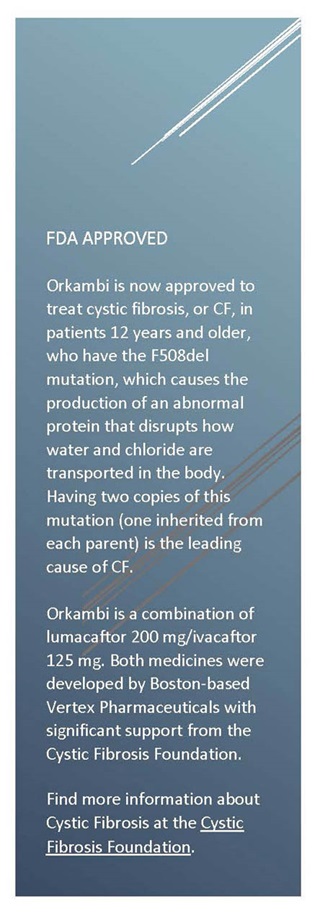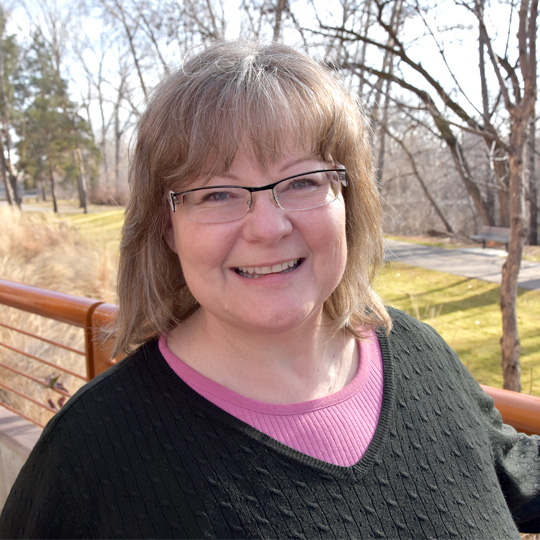FDA OKs Ground-breaking Drug to Treat Cystic Fibrosis, Trialed at St Luke's


The U.S. Food and Drug Administration on July 2 approved the first drug for cystic fibrosis that treats the cause of the disease in nearly half the people who have it, based on two large clinical trials co-led by researchers at St. Luke’s Cystic Fibrosis Center of Idaho.
Results of the clinical trials show that the new drug successfully treat the problem protein in about 49 percent of people with cystic fibrosis, and that it reduces the leading cause of death from the disease – lung infections or pulmonary exacerbations, by 40 percent.
“This is the application of a drug class called small molecules that can actually change a protein, to make it functional on a membrane at the cellular level,” said Dr. Perry Brown, co-director of the St. Luke’s Cystic Fibrosis Center of Idaho and the Center’s primary investigator in the clinical trials for Orkambi. “It is the first medicine that prevents the production of thick secretions in these patients.”
About eight patients at St. Luke’s CF center participated in the clinical trials with about 1,092 other CF patients in six countries from April 2013 to April 2014. Connor Allen, 17, a senior at Twin Falls High School, was one of St. Luke’s participants.
As an infant, Connor continually had a cold, said Luke Allen, his father. Connor was diagnosed with CF at 3 months old after he became seriously ill. As a young child, he also got pneumonia about once a year.
Since taking part in the clinical trials at the Cystic Fibrosis Center of Idaho, his father has noticed that he’s been able to recover better from lung infections and respiratory illnesses.
“His lungs are strong enough that he’s able to work through the issue and clear his lungs out himself instead of going to the hospital and taking antibiotics,” Luke Allen said. “His lungs are stronger, lung function is stronger.”
Dr. Brown said the medicine or a placebo was given to St. Luke’s patients only over 24 weeks. And lung function, the amount of air a patient can blow from the lungs in one second, increased in volume by 5 percent overall for patients taking Orkambi.
“To grasp the significance, when you picture a graph of someone’s lung function, it’s often that slow slope downward with a steeper drop during pulmonary exacerbations. That’s when they lose ground most quickly,” Dr. Brown said.
But when CF patients take Orkambi, the slope of deterioration is less extreme, lung function can actually improve, and there are fewer pulmonary exacerbations. All three benefits add up to significantly better lung function through the course of patients’ lives, he said.

“This is going to impact our patients greatly; and when our patients are able to take this drug at a young age and continue it through their lifetime, we’re going to see their life expectancy extend by a decade or more,” Dr. Brown said.
About 14,000 cystic fibrosis patients across the United States have a pair of the defective gene that causes CF. More than half, about 8,500 patients, are age 12 or older.
More drugs to treat CF are in the pipeline.
“There’s so much hope for these drugs,” said Dixie Durham, a certified clinical research coordinator at St. Luke’s Cystic Fibrosis Center of Idaho and for the clinical trials at St. Luke’s. “In my career at St. Luke’s we’ve doubled the survival age.”
When CF was first described in the late 1930s, patients died as infants. By the early 1960s, the life expectancy was about 5 years old. Now it is 40.7, but St. Luke’s has some patients with CF who live into their 70s for any of several reasons – other good genes, good adherence to the protocols and treatment visits.
“Even with all these advances this is a devastating disease,” Durham said. “It kills people far younger than they should be dying. We just need to find out how to fix this.”
St. Luke’s Health System has a robust research department, and the CF research program is one of many addressing various diseases. Research benefits patients by giving them access to the latest drugs and treatments.
About The Author

Sandra Forester works in the Communications and Marketing department at St. Luke's.

